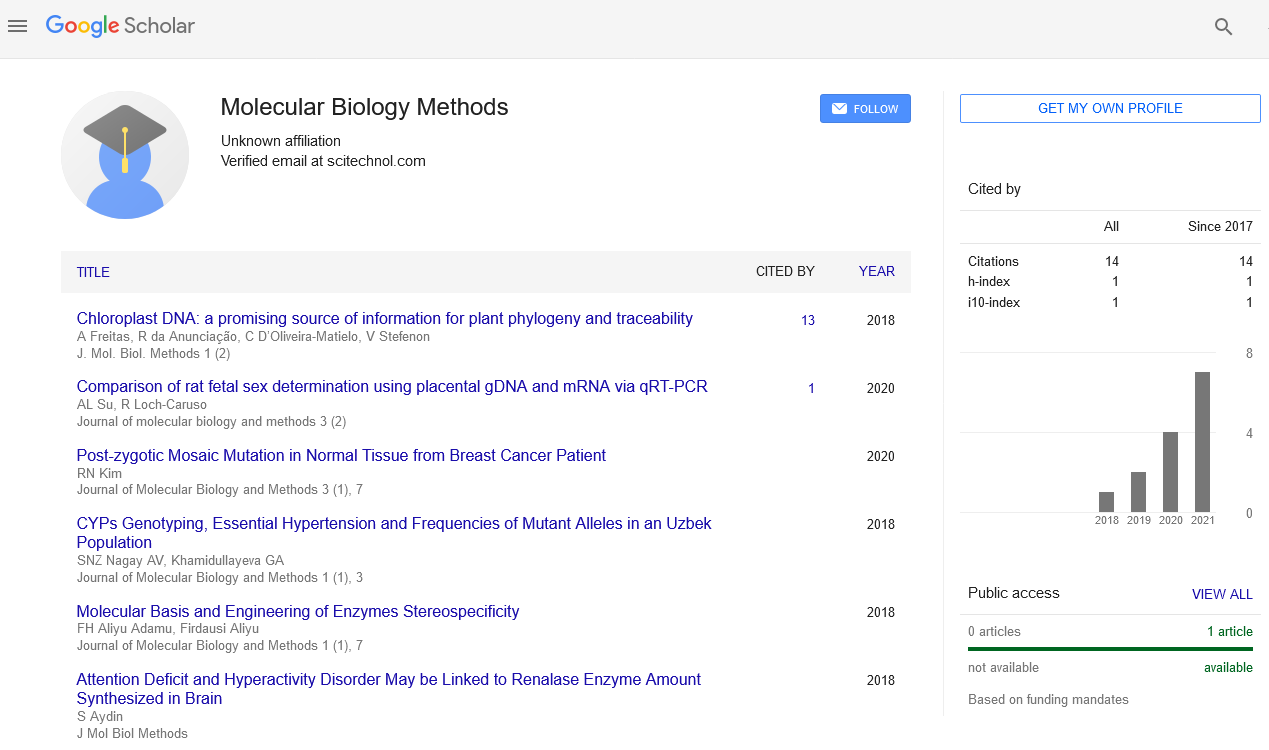Perspective, J Mol Biol Methods Vol: 6 Issue: 3
Exploring the Role of Immunology in Health and Diseases
Peter Heidie*
1Department of Otolaryngology, The Ohio State University, Columbus, United states of America
*Corresponding Author: Peter Heidie,
Department of Otolaryngology, The Ohio
State University, Columbus, United states of America
E-mail: peter_heide@osu33.edu
Received date: 23 August, 2023, Manuscript No. JMBM-23-118067;
Editor assigned date: 25 August, 2023, PreQC No. JMBM-23-118067 (PQ);
Reviewed date: 08 September, 2023, QC No. JMBM-23-118067;
Revised date: 15 September, 2023, Manuscript No. JMBM-23-118067 (R);
Published date: 22 September, 2023, DOI: 10.4172/jmbm.1000142
Citation: Heidie P (2023) Exploring the Role of Immunology in Health and Diseases. J Mol Biol Methods 6:3.
Description
The human immune system is a marvel of evolution, a complex network of cells, proteins, and pathways designed to protect the body from pathogens and maintain its health. Immunology, the study of the immune system, plays a pivotal role in understanding the body's defence mechanisms and the intricate relationship between immunity and disease.
Before delving into its role in health and disease, it is necessary to understand the fundamental principles of immunology. The immune system comprises various cells, including white blood cells (leukocytes), such as T cells, B cells, and natural killer cells, as well as proteins like antibodies and cytokines. Innate immunity provides immediate, nonspecific protection against pathogens, while adaptive immunity is specific, targeting particular pathogens and providing memory of past infections.
The immune system recognises foreign invaders through molecules called antigens. Once detected, the immune system mounts a response to neutralise the threat. In health, the immune system continually surveys the body for signs of infection or cellular abnormalities. It identifies and eliminates rogue cells, viruses, bacteria, and other pathogens.
The immune system plays an essential role in tissue repair and maintaining homeostasis. Immune cells help remove damaged or dead cells, ensuring healthy tissue turnover. A healthy immune system is capable of distinguishing between self and non-self antigens. Immunology studies help to understand how this self-tolerance is maintained to prevent autoimmune diseases. Immunology also explores how the immune system changes with age, contributing to the understanding of age-related diseases and the vulnerability of older individuals to infections. Immunology is central to the understanding of infectious diseases. It helps us to comprehend how pathogens evade the immune system and how vaccines can prevent infections.
Autoimmune disorders occur when the immune system mistakenly targets the body's own tissues. Immunology studies are important in unravelling the mechanisms behind these conditions. Allergic diseases, such as asthma and allergic rhinitis, are immune system responses to harmless substances. Immunology delves into the causes and treatments of allergies. The field of immuno-oncology explores ways to harness the immune system to combat cancer. Immunotherapies like checkpoint inhibitors have shown remarkable success in cancer treatment. Immunology is essential in diagnosing and managing immunodeficiencies, such as HIV or AIDS, where the immune system is compromised.
Immunology studies have led to the development of vaccines that prevent diseases like polio, smallpox, and, more recently, COVID-19. Understanding immunology is important for organ transplantation, as it helps prevent graft rejection and improve transplant success rates. Monoclonal antibodies and other biological therapies, rooted in immunology, have transformed the treatment landscape for various diseases. Immunological studies aid in the development of precision medicine approaches, tailoring treatments to an individual's immune response.
Immunological assays are essential in diagnosing infectious diseases, allergies, and autoimmune disorders. Immunology has made great strides in improving health and combatting diseases, yet many challenges remain. These include understanding the complex interplay of immune responses, addressing immune-related adverse effects in therapies, and developing new treatments for previously untreatable conditions. The future of immunology is promising. Advancements in technologies like Clustered Regularly Interspaced Short Palindromic Repeats (CRISPR) and single-cell sequencing are enabling experts to explore the immune system with unprecedented precision.
Conclusion
Immunology is an indispensable field in medicine and biology, with a profound impact on both health and disease. It enables us to comprehend the complexities of the immune system, develop lifesaving vaccines, and design innovative therapies for various conditions, including cancer and autoimmune diseases. As the knowledge of immunology continues to expand, so does the ability to promote health and combat diseases, making this field an essential component of modern medicine and studies.
 Spanish
Spanish  Chinese
Chinese  Russian
Russian  German
German  French
French  Japanese
Japanese  Portuguese
Portuguese  Hindi
Hindi 